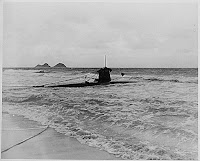The obvious place to start is the scene where Quint, the fisherman, describes the shark attacks that followed the sinking of the U.S.S. Indianapolis by a Japanese submarine.
Quint says, "Japanese submarine slammed two torpedoes into our side, Chief. It was comin' back from the island of Tinian Delady. Just delivered the bomb—the Hiroshima bomb. Eleven hundred men went into the water. Vessel went down in twelve minutes. Didn't see the first shark for about a half an hour."
Quint is referring to real events, the actual sinking of the Indianapolis after it delivered the atomic bomb. Moreover, at an unconscious, symbolic level, Quint is creating an equation between sharks and Japanese soldiers. What Quint says about sharks—"he's got lifeless eyes, black eyes, like a doll's eye. When he comes at ‘ya, doesn't seem to be livin'"—could just as well have been describing the WWII American stereotype of the "inscrutable" Japanese soldier with lifeless eyes. Furthermore, through such stereotypes, both the shark and the Japanese soldier were made out to be an enemy that suddenly attacks the nation on its own soil (the "sneak attack" on Pearl Harbor, like Amityville being attacked on the 4th of July), and a relentless enemy that hides in the water (a Japanese submarine, the shark attacking Amityville).
 |
| Japanese Submarine, 1941. Flickr, Marion Doss. |
 |
| Shark fin. Flickr, Anita363. |
In particular, when the shark gets blown to pieces at the end of the movie, viewers are encouraged to feel that such destruction was fully justified, whereas in real life polls show that Americans have felt increasingly conflicted and regretful about dropping atomic bombs on Japanese civilians. (In a related generational shift, people today are less likely to be disturbed by a doll's eyes or uncannily-realistic robot face than earlier generations were.) Even those older Americans who felt that dropping the bomb was necessary may have later come to believe that Americans lost the moral high ground when we killed thousands of women and children, violating a basic moral ideal that had been in place throughout our entire history as a nation. Many Americans don't like to talk about these ethical problems—but most do like watching this movie and rooting for the destruction of a shark that was hellbent on killing us, including our children.
 |
| Hiroshima bomb cloud, U.S. government photo. |
 |
| Jaws ending. |
Recognizing the Shark
It gets even more complicated when you consider American attitudes toward German soldiers in WWII. For example, here's what one American soldier remembered about a battle on the front lines near Cologne, Germany:
"We were passing the Germans we killed. Looking at the individual German dead, each took on a personality. These were no longer an abstraction. These were no longer the Germans of the brutish faces and the helmets we saw in the newsreels. They were exactly our age. These were boys like us. ...Once the helmet is off, you're looking at a teenager, another kid." —Robert Rasmus, interview reprinted in Studs Terkel's book The Good War: An Oral History of WWII.
This soldier's story sounds like Quint's points about the shark's eyes—how they seem "lifeless," or as this soldier put it, like "an abstraction." German soldiers with helmets that hide their eyes also fit Quint's image of the shark, which is the underlying stereotype of all enemies in modern Western warfare: lifeless, inhuman, animalistic.
 |
| U.S. wartime poster, 1942, Office of Emergency Management.. |
But as noted by the American soldier, all this changes when the enemy helmet comes off, when you get up close and see that the supposed monsters are just teenage boys like you. Quint notes this same type of sudden switch in perspective when he says, "Until he [the shark] bites 'ya and those black eyes roll over white..."
In other words, Jaws and WWII both create confusing, disturbing oscillations between media stereotypes and individual personalities, between abstract concepts and real beings, between death and life. The shark seems dead but then you realize how alive he is...just before he kills you. WWII enemy soldiers seem like abstractions, but then you realize they're humans...just before you kill them.
Hope for Humanity?
I find it comforting to hear the American soldier Rasmus say he eventually recognized the humanity of the German soldiers.
 |
| American helping wounded German soldier, 1944. Army Surgeon General, National Archives and Records Administration. |
Jaws, on the other hand, will remain popular as long as people continue to wonder and worry about war, death, and stereotypes.
Further Reading:
See also my post on shark attacks, tears, and the USS Indianapolis, and my post asking, Why do good people resent Hooper and scientists like him?
Here's my co-authored book chapter on "Jaws," with more extended analysis
For more on Quint and many others' feelings of revulsion and confusion at dolls' eyes and similarly uncanny, hybrid phenomena, see research on the "uncanny valley in reactions to humanoid robots and "creepy dolls." And for the research cited above on contemporary reactions to uncannily human robot faces, see this short article.
Robert Willson Jump Cut journal article, where he explores the resonance between Jaws and submarine movies.







No comments:
Post a Comment